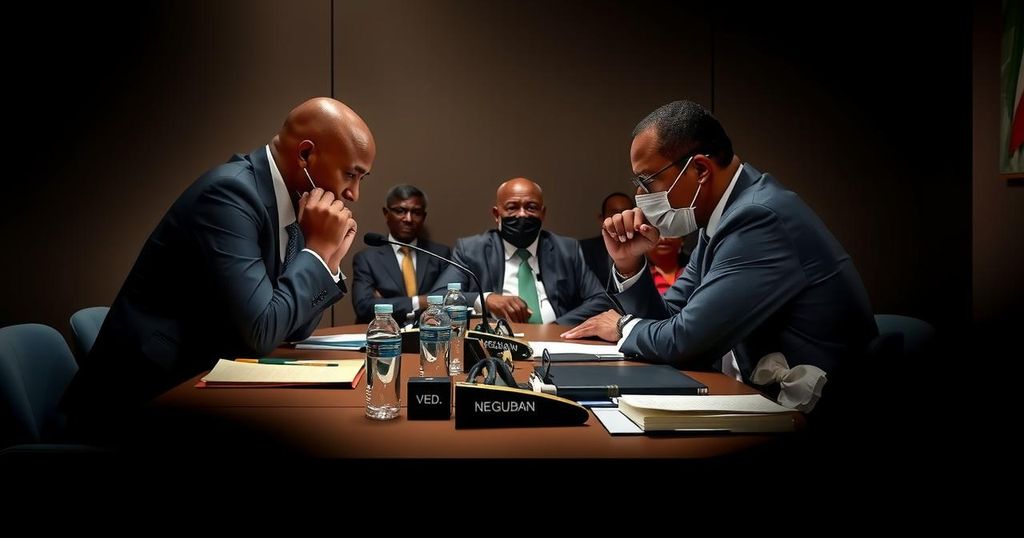Global news
AFRICA, BBC, CIVIL WAR, CONFLICT, DARFUR, DAVID LAMMY, DMITRY POLYANSKIY, EUROPE/ASIA, HUMANITARIAN CRISIS, LAMMY, LINDA THOMAS - GREENFIELD, NEW YORK, NORTH AMERICA, RAPID SUPPORT FORCES, REFUGEE CRISIS, RSF, RUSSIA, SECURITY COUNCIL, SIERRA LEONE, SUDAN, UK, UN, UN SECURITY COUNCIL, UNITED STATES, US, WAR
Leila Ramsay
0 Comments
Russia Vetoes UN Ceasefire Resolution for Sudan Amid Global Criticism
Russia has vetoed a proposed UN Security Council resolution aiming for a ceasefire in Sudan, drawing sharp criticism from the UK and the US. The civil war in Sudan has resulted in immense humanitarian suffering, with over 11 million displaced and tens of thousands dead. Despite support from other council members, the resolution failed due to the veto, highlighting ongoing geopolitical tensions and the urgent need for humanitarian intervention.
In a recent development at the United Nations, Russia exercised its veto against a draft resolution supported by the UK and Sierra Leone which sought to establish a ceasefire in Sudan amidst its ongoing civil conflict. The UK Foreign Secretary, David Lammy, condemned this action as a “disgrace,” while Russia contended that the UK was interfering in Sudan’s internal matters without proper involvement of its government. The civil war, which began in April 2022 between Sudan’s army and the Rapid Support Forces (RSF), has resulted in significant loss of life, displacement of over 11 million individuals, and a humanitarian crisis marked by widespread starvation. Monday’s proposal urged both conflicting parties to cease hostilities and return to negotiating a lasting peace, while addressing past commitments to civilian safety. The resolution particularly highlighted the RSF’s actions in Darfur, a region severely affected by the violence. Despite the unanimous support of the other 14 members of the Security Council, the veto thwarted the resolution’s passage. During the meeting, Mr. Lammy questioned the ongoing violence against civilians, urging Russia to reconsider its stance. U.S. Ambassador to the UN, Linda Thomas-Greenfield, echoed these sentiments by accusing Russia of prioritizing its political objectives over humanitarian concerns. Dmitry Polyanskiy, representing Russia, dismissed the allegations, asserting that the proposed resolution disregarded Sudanese sovereignty and represented an attempt to further Western agendas. Sudan’s own representative lamented the absence of essential clauses in the draft, which included a condemnation of foreign support for the RSF and sought a designation of the RSF as a terrorist entity due to its violent tactics against civilians. This ongoing conflict in Sudan remains a critical issue, with multiple parties engaged in the discussions, all of which underscore the complexities of international relations and humanitarian interventions in sovereign states. The repercussions of this conflict continue to resonate across countries, highlighting the need for a concerted global effort to address and resolve the crisis efficiently.
The civil war in Sudan, which commenced in April 2022, has escalated into a severe humanitarian crisis, resulting in significant casualties and displacements. The primary conflict involves the Sudanese Armed Forces and the Rapid Support Forces, a powerful paramilitary group, vying for control of the nation. As millions suffer due to the violence and its repercussions, international responses have ranged from condemnation to calls for action in the United Nations. The recent UN Security Council discussions reflect the intricate balance of national sovereignty, humanitarian intervention, and geopolitical strategies, particularly concerning the roles of influential nations such as Russia and the UK.
The veto exercised by Russia against the ceasefire resolution in Sudan illustrates the intense geopolitical dynamics at play within the UN Security Council, as well as the ongoing humanitarian crisis in the region. While the UK and the US voice significant concerns over civilian suffering and urgent need for intervention, Russia’s defense of Sudanese sovereignty casts a shadow over the potential for effective international aid and peace negotiations. As violence persists, the need for a collaborative approach to resolving the crisis becomes increasingly critical.
Original Source: www.bbc.co.uk




Post Comment